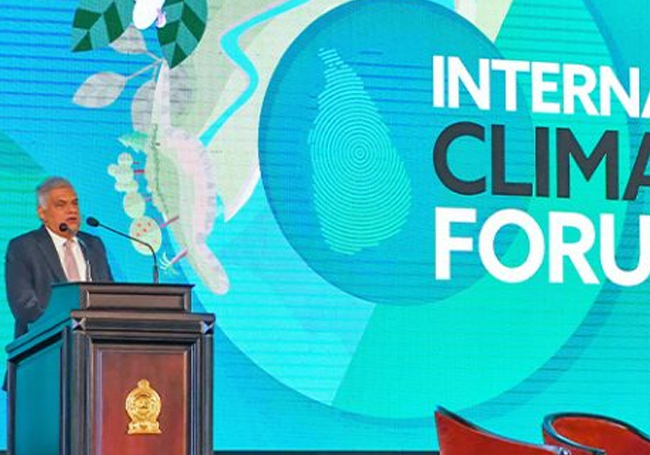In a significant development, Sri Lanka is making notable strides towards combating climate change and transitioning into a green economy. Speaking at an international forum, President, Ranil Wickremesinghe, outlined the country’s ambitious plans for environmental sustainability and economic growth.
The President made these remarks at the first International Climate Change Forum at Temple Trees yesterday (02). This conference ends today (03).
President Wickremesinghe emphasized that Sri Lanka’s economic model would be built on competitiveness, digital transition, energy transition and the transformation to a green economy. He pointed out that the country’s small size could be advantageous, given its potential for excess green energy, including solar, wind power and hydrogen.
However, Sri Lanka currently lacks the expertise to formulate detailed plans for this transition. To address this, the country is reaching out to multilateral development banks and bilateral partners to obtain the necessary knowledge and support.
Furthermore, President Wickremesinghe disclosed Sri Lanka’s intention to present a climate prosperity plan at COP 28, with the goal of reaching net zero emissions by 2040. This ambitious endeavour, while necessary for the planet’s well-being, comes with a substantial cost of over $100 billion USD over 20 years.
To meet these financial challenges, Sri Lanka is committed to raising a significant portion of the required funds through commercial means. The president acknowledged the tough task ahead but expressed determination to become the first country in the region to achieve a green economy.
In addition to these efforts, Sri Lanka is taking a proactive stance in addressing climate change on a global scale. President Wickremesinghe revealed plans to establish the International Climate Change University (ICCU), emphasizing that it should be an international stakeholder university rather than a solely Sri Lankan institution. The government has already allocated 600 acres overlooking the Kothmale reservoir for this purpose.
Sri Lanka is also investing in building its capacity for climate finance, recognizing that the discussions on this topic primarily involve the northern hemisphere, multilateral organizations, and major players like China and India. The president stressed the need for the global south, including Sri Lanka, to develop expertise in climate finance, debt relief and related economic issues.



